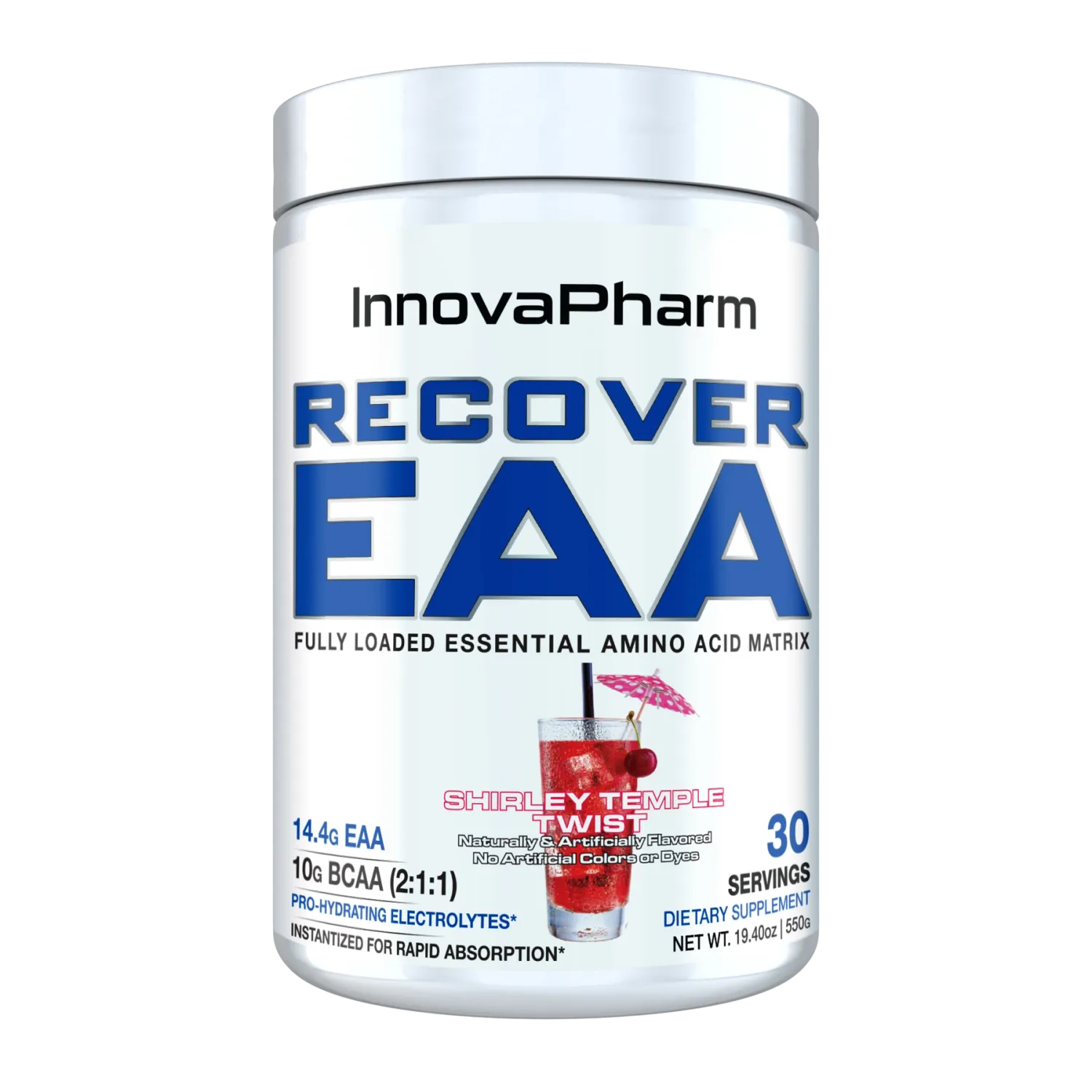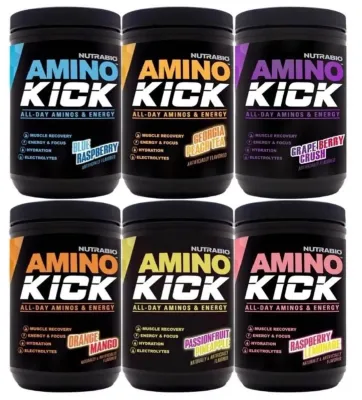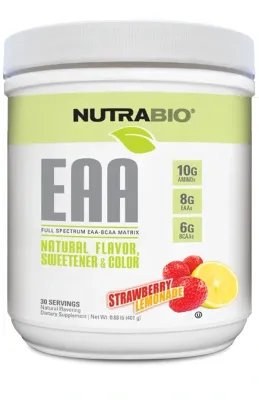🇺🇸 Presidents' Day — 15% OFF $75+
InnovaPharm Recover EAA
4.8
5 reviews
Reviews from verified customers who have purchased products at this store.
$35.99
Save automatically when you buy 2 or more
Buy & Earn Loyalty Cash
Earn $1.79 in Loyalty Cash to use on future orders
Loyalty Cash is cash back you earn on purchases and can use on future orders. Your balance updates after payment and may be recalculated at checkout.
Essential Amino Acids for Recovery & Muscle Growth
Flavor
Size
In stock: 1 available
1
Enjoy automatic savings when you buy more of the same item — identical size and flavor required to qualify.
| Quantity | Price per item | Discount |
| 2 items | $31.99 | 11% off |
Save to Favorites
Customer reviews
Reviews only from verified customers
Reviews are only accepted from verified customers who have signed in and purchased the products.
Samuel L.
La Mirada,CA,
United States
07-04-2025
solid flavor, very slight bitterness
InnovaPharm Recover EAA
Product Details
Brand: InnovaPharm
Form: Powder
Goal: Support Muscle Recovery
Serving Size: 1 Scoop
Servings Per Container: 30
UPC: 636946251741
Complete essential amino acid (EAA) supplement, supplying all nine essential amino acids your muscles require to build and repair protein.
Recover EAA™ Features
- Massive dose of EAA's (over 14g!) to stimulate protein synthesis
- 10g (2:1:1) of BCAA!!
- Substantial doses of Lysine & Threonine (Extremely beneficial for recovery, yet often overlooked)
- Supports muscle recovery and growth
- Halts muscle protein breakdown
- Bolsters immune system function
- 3 mouth-watering flavors
- Industry-first flavor -- OMG! (Orange Mango Grapefruit)
- Electrolytes (including Pink Himalayan Salt) to support hydration and muscle function
- No *FLUFF* or filler amino acids
- Zero artificial colors / Zero stimulants / Zero proprietary blends
Really, ANOTHER EAA Supplement?
Yeah, yeah, yeah...we know what you’re thinking.
EAAs are the darling of the supplement industry at the moment, with virtually every company releasing some type of essential amino acid supplement within the past 12 months.
Surely consumers don’t need yet another copycat EAA supplement, right?
But, here’s thing.
Take a close look at those other EAA formulas, and you’ll notice a few things:
- They add in tons of “filler” amino acids like glutamine, taurine, and glycine to bulk up the total amino count
- They under-dose the most important (and expensive) amino acids
- They completely leave out one or two of the essential amino acids because they are difficult to flavor
- They taste terrible
Recover EAA™ was formulated to address the shortcomings rampant in the amino acid market and provide a formula that not onlysupplies quality doses of ALL NINE essential amino acids, but delivers “enhanced recovery” that you’ll feel and notice from the very first serving.
Down below we’ll explain in greater detail why Recover EAA™ is markedly different from any other EAA supplement on the market, but first, here’s the “50,000 foot view” of the product…
Who is Recover EAA™ for?
Recover EAA™ is for anyone (male or female, young or old) who eats right and trains hard, yet still struggles to feel fully recovered in the days after a grueling workout.
Recover EAA™ contains NO stimulants and can be taken any time of day to support muscle recovery and growth, including pre workout, post workout, or as a low-calorie between meal snack.
Recover EAA™ Ingredients
Leucine (5g)
Leucine really needs no introduction these days, especially in fitness circles. It’s the pride and joy of every amino acid formula and one of the main reasons whey protein is a staple for every athlete.
What makes leucine the proverbial belle of the ball (and BCAA) is its ability to stimulate the mechanistic target of rapamycin (mTOR).[1]
mTOR is a cellular signaling pathway that which dictates cell metabolism, growth, proliferation, survival.[2] mTOR is present in two complexes (mTORC1 and mTORC2), but for the purposes of muscle recovery and growth, the one we’re interested in is mTOR1 as it is responsible for muscle protein synthesis (i.e. muscle building).
Not only does leucine directly stimulate protein synthesis, it also stops muscle protein breakdown (a.k.a. catabolism), meaning it affects both factors that impact muscle growth.
Isoleucine (2.5g)
Isoleucine is similar in structure to leucine and can also stimulate muscle protein synthesis. Though, it’s not quite as potent of an “anabolic trigger” as leucine, which is why it’s known as leucine’s “weaker brother” in certain circles.
What it lacks in mTOR-stimulating power, it makes up for in other areas. More specifically, isoleucine is required for hemoglobin (the oxygen-carrying protein in red blood cells) as well as blood sugar and energy regulation.[3]
It even has been noted to enhance glucose uptake and utilization by skeletal muscle use during high-intensity exercise.[4]
Valine (2.5g)
The oft-forgotten third member of the BCAA family, valine doesn’t garner quite as much discussion as leucine or even isoleucine. That’s because it’s relatively under-researched compared to the other two BCAAs.
However, valine has been noted to aid energy conversion glycogen synthesis in skeletal muscle, which helps combat catabolism.[5]
Lysine (2g)
HIGH DOSE ALERT!
Most other EAA supplements on the market include 300mg lysine, at most.
Recover EAA™ supplies a heaping 2g of L-Lysine per serving.
So, why the high dose of lysine?
Well, in addition to its role is supporting protein synthesis (and thereby muscle growth and recovery), lysine also supports a number of other important biological processes, including[6,7,8]:
- Creation of antibodies, which are essential to immune system support.
- Formation of collagen -- the protein that helps give structure and support to your skin and bones.
- Binding agent
- Wound healing
- Formation of new blood cells
- Absorption of calcium
- Competitively inhibits uptake of arginine, reducing duration of HSV-1
And to top it off, Lysine is also needed for the synthesis of carnitine, the biological “taxi” that shuttles fatty acids into the mitochondria so that they can be burned for energy.
Threonine (2g)
Threonine is another scantily dosed essential amino acid in supplements, and much like lysine, it doesn’t get the recognition it deserves. Similar to lysine, threonine plays a critical role in the health and function of the immune system as it is a vital component of immunoglobulins (antibodies).[9] As such, deficiencies in threonine could adversely affect antibody production.
But there’s more.
Threonine is required from the production of the amino acids glycine and serine, both of which serve key roles in muscle protein synthesis. Moreover, threonine also aids collagen synthesis, which begins to decline around age 25 in most adults, and supports gut function.[10,11]
And finally, the versatile amino acid works in tandem with methionine (another essential amino acid) and aspartic acid to enhance lipotropic function -- digestion of fats by the liver.
Histidine (100mg)
Histidine is a precursor to histamine and carnosine.
If that second compound sounds somewhat familiar, it should.
Carnosine is the intracellular buffer in skeletal muscle which helps remove excess H+ ions, allowing you to train longer and harder. Beta alanine is typically supplemented to help boost carnosine stores in muscle tissue.
The way beta alanine does this is by binding to histidine to form carnosine.[12]
Therefore, if you do not have adequate amounts of histidine, your beta alanine supplementation may not be quite as effective as you had hoped.
Histidine also plays important roles in promoting wakefulness and cognitive function, due to the fact that histidine is required for development and maintenance of the myelin sheaths.[13]
In case you weren’t aware, myelin sheaths insulate the axon of nerve cells allowing them to send electric signals more quickly and efficiently.
Finally, histidine has been noted to prevent spontaneous blood clots, by reducing platelet aggregation, which supports healthy blood flow and cardiovascular function.[14]
Methionine (100mg)
Methionine is an essential amino acid, that truth be told, most supplement manufacturers and flavor technicians would rather not be quite so essential.
The reason for this is that methionine on its own tastes absolutely terrible and is insanely hard to make palatable. That’s why it’s quite frequently included in EAA supplements at doses between 25-50mg, or left out altogether.
Recover EAA™ includes 2-4x as much methionine as other EAA supplements.
So, what does methionine do exactly?
In addition to building proteins, it also helps create sulfur-containing molecules which are important for the modification and repair of DNA, protection of tissues, and maintaining proper functioning of cells.[15,16]
Methionine is able to do this because it contains a sulfur group, something most amino acids do not have.
This amino acid also serves as a precursor to cysteine, one of the body’s most powerful and important antioxidants.[17]
And, as we mentioned above when discussing threonine, methionine also supports fat digestion by the liver.
Phenylalanine (100mg)
Phenylalanine is an EAA that is vital to the proper functioning of the central nervous system. The reason we say that is because phenylalanine is used to produce a slew of neurotransmitters and catecholamines.
Specifically phenylalanine supports synthesis of phenylethylamine (PEA) -- a feel good, euphoric neurotransmitter -- as well as tyrosine, the precursor to dopamine and the fat-burning catecholamines adrenaline and noradrenaline.[19]
Due to the wide-ranging effects of phenylalanine it’s no surprise researchers have explored its use as a means to treat depression.
In fact, one study of note in depressed patients found that supplementation with phenylalanine (75-200mg/day) documented significant improvement in depressive symptoms, with the majority of subjects requiring no further treatment.[18]
Tryptophan (100mg)
Tryptophan is the poor amino acid that’s often blamed for the post-Thanksgiving “coma” everyone experiences after feasting. This is due to the fact that tryptophan is a precursor to the neurotransmitter serotonin, which impacts feelings of well-being, cognition, and behavior.[20]
The body can subsequently convert serotonin to melatonin.
Note: This is probably why people blame the tryptophan in turkey for making them tired, but let’s be honest….most people get sleepy from eating too much, particularly high-carb foods which encourage tryptophan uptake into the brain and subsequently boost serotonin and melatonin.
In addition to improving serotonin production (and overall mood), tryptophan also benefits memory and learning.[21]
Recover EAA™ Dosing
Consume 1 scoop mixed with 16-24 ounces of water during training. On non-training days, consume 1 scoop any time. Use daily for best results.
Recover EAA™ References
- Lynch CJ. Role of leucine in the regulation of mTOR by amino acids: revelations from structure-activity studies. J Nutr. 2001;131(3):861S-865S.
- Laplante M, Sabatini DM. mTOR signaling at a glance. J Cell Sci. 2009;122(Pt 20):3589-3594. doi:122/20/3589 [pii] 10.1242/jcs.051011.
- Doi M, et al. Isoleucine, a potent plasma glucose-lowering amino acid, stimulates glucose uptake in C2C12 myotubes. Biochem Biophys Res Commun. (2003)
- National Center for Biotechnology Information. PubChem Compound Database; CID=6306,https://pubchem.ncbi.nlm.nih.gov/compound/6306
- National Center for Biotechnology Information. PubChem Compound Database; CID=6287,https://pubchem.ncbi.nlm.nih.gov/compound/6287
- Yamauchi M, Sricholpech M. Lysine post-translational modifications of collagen. Essays Biochem. 2012;52:113-33.
- Guo S, Dipietro LA. Factors affecting wound healing. J Dent Res. 2010;89(3):219-29.
- Datta D, Bhinge A, Chandran V. Lysine: Is it worth more?. Cytotechnology. 2001;36(1-3):3-32.
- Sudhir Borgonha, Meredith M Regan, Seung-Ho Oh, Mervelina Condon, Vernon R Young; Threonine requirement of healthy adults, derived with a 24-h indicator amino acid balance technique, The American Journal of Clinical Nutrition, Volume 75, Issue 4, 1 April 2002, Pages 698–704, https://doi.org/10.1093/ajcn/75.4.698
- Jiravanichanun, Nattha, et al. "Threonine in Collagen Triple-helical Structure." Polymer Journal, vol. 38, no. 4, 2006, pp. 400-403.
- Li, Defa. "Specific roles of threonine in intestinal mucosal integrity and barrier function." Frontiers in Bioscience, vol. E3, no. 4, 2011, pp. 1192-1200.
- Salah, E, Garbilla, Alan j. Sinclair, Carnosine: physiological properties and therapeutic potential. Age and Ageing; 2000; 29: 207-210.
- Singer, M. and Salpeter, M. M. (1966), The transport of 3H‐l‐histidine through the Schwann and myelin sheath into the axon, including a reevaluation of myelin function. J. Morphol., 120: 281-315. doi:10.1002/jmor.1051200305
- Steinhauer, H.B., et al. "Effect of L-histidine in vivo on human platelet function and arachidonic acid metabolism." Prostaglandins, Leukotrienes and Medicine, vol. 18, no. 2, 1985, pp. 245-254.
- John T. Brosnan, Margaret E. Brosnan; The Sulfur-Containing Amino Acids: An Overview, The Journal of Nutrition, Volume 136, Issue 6, 1 June 2006, Pages 1636S–1640S, https://doi.org/10.1093/jn/136.6.1636S
- Wu, Guoyao, et al. "Glutathione Metabolism and Its Implications for Health." The Journal of Nutrition, vol. 134, no. 3, 2004, pp. 489-492.
- Neidhart, Michel. "Methyl Donors." DNA Methylation and Complex Human Disease, 2016, pp. 429-439.
- Beckmann, H., et al. "Dl-phenylalanine in depressed patients: An open study." Journal of Neural Transmission, vol. 41, no. 2-3, 1977, pp. 123-134.
- Ueda, Keisuke, et al. "The effects of phenylalanine on exercise-induced fat oxidation: a preliminary, double-blind, placebo-controlled, crossover trial." Journal of the International Society of Sports Nutrition, vol. 14, no. 1, 2017.
- Richard DM, Dawes MA, Mathias CW, Acheson A, Hill-Kapturczak N, Dougherty DM. L-Tryptophan: Basic Metabolic Functions, Behavioral Research and Therapeutic Indications. International Journal of Tryptophan Research : IJTR. 2009;2:45-60.
- Riedel, W. J., Klaassen, T., Deutz, N. E., van Someren, A., & van Praag, H. M. (1999). Tryptophan depletion in normal volunteers produces selective impairment in memory consolidation. Psychopharmacology, 141(4), 362–369.
You May Also Like
Everyday Low Price
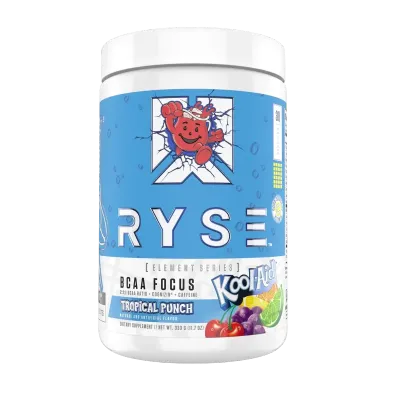
Ryse BCAA Focus
Ryse BCAA Focus
Hydrating BCAA blend with Cognizin® and coconut water
List Price: $26.99
Save 7%
$24.99
New
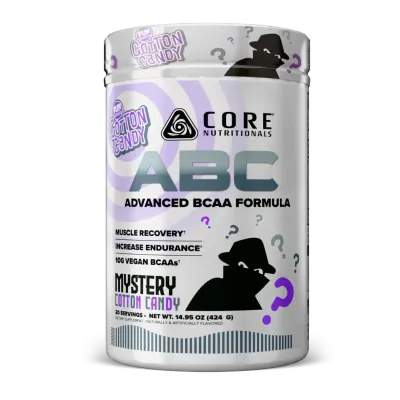
Core Nutritionals ABC BCAA Supplement
Core Nutritionals ABC BCAA Supplement
BCAAs, Beta-Alanine, Citrulline, and Glutamine for Recovery, Endurance, and Muscle Performance
$34.99
10% Off In Cart
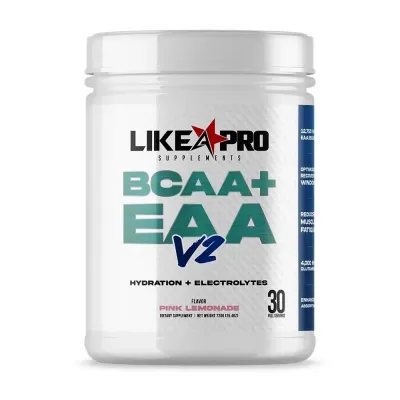
Like A Pro BCAA + EAA V2
Like A Pro BCAA + EAA V2
Recovery & hydration powered by EAAs and glutamine
5.0
List Price: $49.99
Save 10%
$44.99
Powered by Lightspeed
Display prices in:USD
